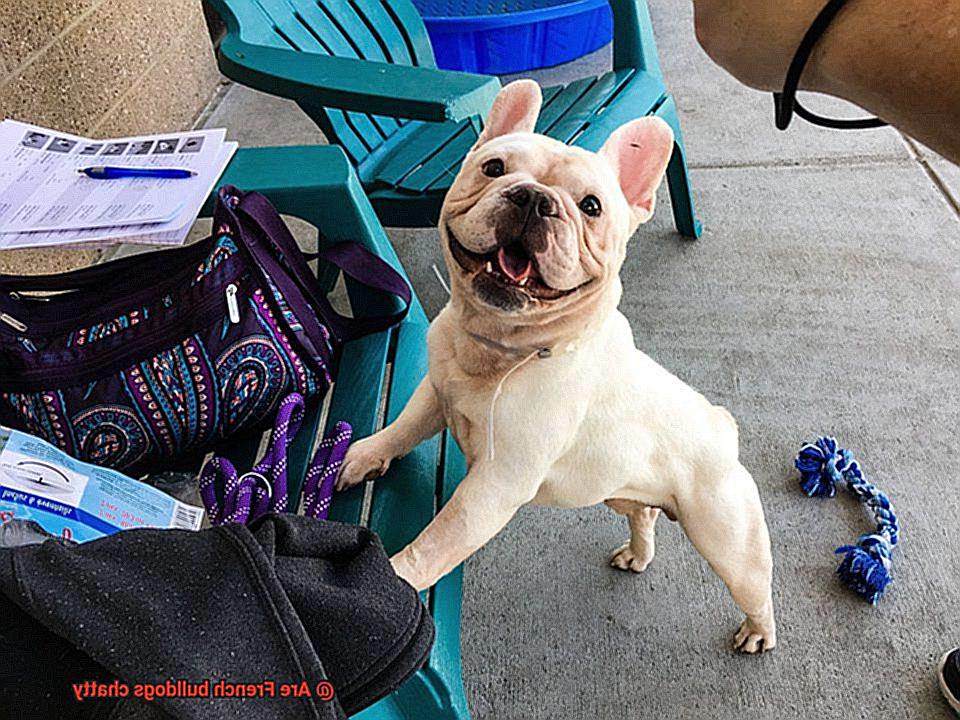Are French bulldogs chatty?
Ever wondered if French Bulldogs are the talkative type? These little bundles of joy may be small in size, but don’t let that fool you – they’ve got big personalities and a knack for communication.
While they might not speak our language, French Bulldogs have their own unique way of expressing themselves that can make them seem surprisingly chatty.
In this blog post, we’re diving into the world of these adorable bat-eared companions to uncover why they’re known to be particularly vocal. From their expressive eyes to their playful antics and endearing vocalizations, get ready to discover just how much these furry friends have to say.
Get ready for a paw-some journey as we unveil the truth behind the age-old saying – “French Bulldogs have a voice of their own.”
Understanding the Personality of French Bulldogs
Contents
- 1 Understanding the Personality of French Bulldogs
- 2 Why French Bulldogs Are Generally Quiet
- 3 How French Bulldogs Communicate Non-Verbally
- 4 Territorial and Protective Tendencies in French Bulldogs
- 5 When Do French Bulldogs Bark?
- 6 The Need for Proper Training and Enrichment
- 7 Exceptions to the Rule: Individual Dogs May Differ
- 8 Tips for Ensuring a Happy and Well-Behaved Companion
- 9 Conclusion
French Bulldogs are beloved for their friendly and affectionate nature. While they may not be the most vocal breed, they have their own charming ways of expressing themselves. In this article, we will explore how French Bulldogs communicate and how their personalities can be shaped through proper training and socialization.
Non-Verbal Communication:
French Bulldogs are masters of non-verbal communication. They use their expressive eyes and ears to convey their emotions. When they’re happy or excited, you may notice their tail wagging vigorously, and their whole body wiggles with joy. If they’re feeling anxious or scared, they may tuck their tails between their legs and flatten their ears against their head. Understanding these cues is crucial for interpreting your French Bulldog’s state of mind.
Vocalizations:
While French Bulldogs are not excessively vocal, they do make sounds to communicate. Instead of barking, they’re more likely to grunt or snort, especially when they’re excited or content. These unique noises add to their endearing personality and make them even more lovable.
Barking:

French Bulldogs are generally not prone to excessive barking. However, they may bark to alert you of potential dangers or strangers approaching their territory. Proper training can help teach them when it’s appropriate to bark and when it’s not.
Socialization and Training:
Proper socialization from an early age is essential for shaping a French Bulldog’s personality. Exposing them to various people, animals, and environments helps them become well-rounded and confident dogs.
Additionally, consistent training helps establish boundaries and teaches them appropriate ways to communicate with their owners.
Why French Bulldogs Are Generally Quiet
French Bulldogs, also known as “Frenchies,” have made a name for themselves as one of the quieter dog breeds. As an expert in all things French Bulldog, let me enlighten you on why these adorable pups tend to be less vocal than their counterparts.
- Low Barking Tendency: French Bulldogs are not known for their excessive barking. Unlike some other breeds that may bark at every passing squirrel or leaf, Frenchies reserve their barks for important matters. This can be attributed to their relaxed and easygoing temperament, which makes them less prone to unnecessary noise-making.
- Companionship Origins: Originally bred as companion dogs, French Bulldogs never had a job that required excessive vocalization. Unlike herding or hunting dogs, their purpose was to provide love and companionship to their humans. This lack of necessity for vocalization has been ingrained in their breed’s DNA, resulting in a more reserved and quiet nature.
- Apartment-Friendly: French Bulldogs make excellent apartment dogs due to their quiet nature. Living in close quarters with neighbors can be challenging if you have a noisy pup, but Frenchies are known for being considerate and not disturbing the peace. This makes them ideal for city dwellers or those with noise restrictions.
- Unique Physical Attribute: One interesting aspect of French Bulldogs is their short muzzles. While this characteristic contributes to their adorable appearance, it also affects their ability to produce loud and prolonged barks. The shape of their muzzle can cause breathing difficulties, making it more challenging for them to be vocal. However, this doesn’t hinder their ability to communicate through other means, such as snorts and grunts.
- Individual Variations: It’s important to note that while French Bulldogs are generally quiet, individual personalities and training can play a role in their vocal tendencies. Some Frenchies may be more talkative than others based on factors such as their unique personality and the training they have received.


How French Bulldogs Communicate Non-Verbally
French Bulldogs may not be the most talkative dogs, but that doesn’t mean they don’t have a lot to say. They communicate non-verbally through their body language, tail position, ear movements, and body posture. Understanding these cues is crucial for owners who want to better connect with their furry companions.
Body Language:
French Bulldogs have a wide range of expressive facial expressions. Raised eyebrows and wide eyes can indicate surprise or curiosity, while a furrowed brow and narrowed eyes may signal frustration or aggression. Paying attention to these subtle changes can help you understand your Frenchie’s emotional state.
Tail Position:
A French Bulldog’s tail is like a mood indicator. A relaxed and wagging tail usually means they are happy and content. Conversely, a tucked tail may suggest fear or anxiety. Keep an eye on your Frenchie’s tail to get a better sense of how they’re feeling.
Ear Movements:
Their ears are another important communication tool. Perked forward ears show that they are alert and interested in what’s happening around them. On the other hand, flattened or backward-facing ears could indicate fear or submission. The position of their ears can reveal a lot about their emotions.
Body Posture:
French Bulldogs use their body posture to convey their feelings. A confident and relaxed Frenchie will have an upright posture with a slightly arched back. On the contrary, a fearful or submissive dog may cower or lower its body closer to the ground. Take note of your Frenchie’s body posture to understand their emotional state.
By paying attention to these non-verbal cues, you can become fluent in Frenchie communication and strengthen the bond between you and your furry friend. Remember that every dog is unique, so take the time to observe your Frenchie’s individual non-verbal language.
Territorial and Protective Tendencies in French Bulldogs
While their instinct to protect their family members and territory is commendable, it is important to train and socialize them properly to prevent excessive aggression or fearfulness towards strangers.
In this article, we will explore how proper training, socialization, and leadership can help French Bulldogs overcome their territorial and protective tendencies, creating well-behaved and friendly companions.
Training:
Proper training is the foundation for addressing territorial and protective behaviors in French Bulldogs. Here are some key training techniques to consider:
- Basic obedience commands: Teaching your French Bulldog commands like “sit,” “stay,” and “leave it” helps establish your role as the pack leader. This allows them to understand boundaries and expectations, reducing the likelihood of aggressive or territorial behavior.
- Positive reinforcement: Using rewards such as treats, praise, or playtime when your French Bulldog exhibits desired behavior reinforces positive associations and encourages them to repeat those behaviors.
- Desensitization exercises: Gradually exposing your French Bulldog to various stimuli, such as unfamiliar people or animals, helps them become more comfortable and less reactive. Start with low-stress situations and gradually increase difficulty over time.
Socialization:
Socializing your French Bulldog from a young age is crucial to help them differentiate between actual threats and harmless situations. Here’s how you can effectively socialize your French Bulldog:
- Puppy classes: Enrolling your French Bulldog in puppy classes provides structured socialization opportunities with other dogs of different breeds and sizes. It also allows them to interact with new people in a controlled environment.
- Controlled introductions: Slowly introduce your French Bulldog to new people, animals, and environments. Use positive reinforcement and rewards to create positive associations. Gradually increase exposure, always prioritizing your dog’s comfort and well-being.
- Exposure to different environments: Taking your French Bulldog on regular outings to parks, cafes, or pet-friendly stores exposes them to various sights, sounds, and smells. This helps them become more adaptable and less reactive to new stimuli.
Leadership:
Establishing yourself as the pack leader is essential in curbing territorial and protective tendencies in French Bulldogs. Here’s how you can assert leadership:
When Do French Bulldogs Bark?
Let’s take a closer look at when and why French Bulldogs may bark.
Alerting to Potential Threats:
French Bulldogs have a natural instinct to protect their family and territory. If they sense something unfamiliar or perceive a potential threat, they may bark to alert their owners. This could include strangers approaching the house or unusual sounds outside. Their alertness and protective nature make them excellent watchdogs.
Separation Anxiety:
Like many other dog breeds, French Bulldogs can experience separation anxiety when left alone for extended periods. Barking may be their way of expressing distress or seeking attention when they feel lonely or anxious. If you notice excessive barking when you’re away, it might be a sign that your Frenchie is feeling anxious and needs some extra support.
Excitement or Playfulness:
French Bulldogs are known for their playful and energetic nature. Sometimes, when they are excited or engaged in a particularly enjoyable activity, they may bark as a form of expressing their enthusiasm and engaging with their owners. It’s their way of saying, “I’m having so much fun.”
Attention-seeking:
French Bulldogs are social dogs that thrive on human interaction. If they feel ignored or want attention, they may resort to barking to get noticed by their owners. This behavior should be addressed early on to prevent it from becoming a habit. Teaching your Frenchie alternative ways to seek attention, such as sitting or offering a toy, can help redirect their focus.
Boredom or Frustration:
Like any dog, French Bulldogs can become bored or frustrated when they lack mental stimulation or physical exercise. In such cases, barking may be a sign of their frustration or an attempt to seek attention and entertainment. Providing them with regular exercise, toys, and interactive puzzles can help alleviate boredom and reduce excessive barking.
Remember, excessive barking in French Bulldogs can sometimes indicate an underlying issue, such as fear, aggression, or discomfort. If your Frenchie starts barking excessively without any apparent reason or if the barking becomes disruptive, it is recommended to consult with a veterinarian or a professional dog trainer to address the behavior and ensure the well-being of your furry companion.
The Need for Proper Training and Enrichment
These little bundles of joy require guidance, mental stimulation, and socialization to thrive and become well-rounded members of our families. In this blog post, I will share my expertise on why training and enrichment are essential for French Bulldogs and provide you with practical tips to ensure your furry friend’s happiness.
Training: The Pathway to Well-Behaved French Bulldogs
- Start Early: Begin training your Frenchie as soon as you bring them home. This early foundation will set the stage for a lifetime of good behavior.
- Basic Obedience: Teach your Frenchie commands like sit, stay, come, and leave it. These commands not only make daily life easier but also ensure their safety in various situations.
- Positive Reinforcement: French Bulldogs respond exceptionally well to positive reinforcement techniques. Shower them with praise, treats, and belly rubs when they exhibit desired behaviors.
- Consistency is Key: Establish a structured environment with clear rules and boundaries. Frenchies thrive in consistent routines that provide them with a sense of security.
Enrichment: Unlocking the Inner Genius of French Bulldogs
- Mental Stimulation: Frenchies are intelligent dogs that require mental challenges to prevent boredom-related behaviors such as excessive barking. Provide interactive toys and puzzle games that engage their minds.
- Exercise: Regular exercise is crucial for the physical and mental well-being of French Bulldogs. Daily walks, playtime, and interactive activities like fetch or hide-and-seek keep them happy and content.
- Socialization: Introduce your Frenchie to various people, animals, and environments from a young age. This exposure helps them develop good social skills and reduces anxiety-related barking.
Seeking Professional Help: When Training Becomes a Challenge
- Individual Needs: Remember that every French Bulldog is unique, and training methods may need to be tailored to their specific personality and temperament.
- Certified Experts: If you’re facing difficulties with training or behavioral issues, don’t hesitate to seek assistance from a certified dog trainer or behaviorist. They can provide personalized guidance and develop a customized training plan.
Proper training and enrichment are the keys to unlocking the full potential of your French Bulldog. By investing time and effort into their development, you’ll be rewarded with a well-behaved companion who brings endless joy to your life.
So, let’s embark on this journey together, guiding our Frenchies to become the best versions of themselves. Remember, a trained and enriched Frenchie is a happy Frenchie.
Exceptions to the Rule: Individual Dogs May Differ
You may have heard that Frenchies are generally a chatty bunch, but let me tell you, exceptions to the rule exist. In this blog post, we’ll explore how French Bulldogs can vary in their chattiness and the factors that influence this behavior. So grab a cup of coffee, sit back, and let’s dive in.
Personality:
Just like humans, French Bulldogs have their own unique personalities. Some may be more talkative and prone to barking, while others may be quieter and more laid-back. It all depends on the individual dog’s temperament and character.
Upbringing:
A dog’s upbringing plays a crucial role in shaping their behavior, including their chattiness. Proper socialization and training from an early age can help teach French Bulldogs how to communicate effectively without excessive barking. Remember, well-behaved dogs are not born, they’re made.
Protective Nature:
French Bulldogs are known for their protective instincts. They may bark to alert their owners of potential threats or unfamiliar situations. If they lack proper socialization or feel anxious or stressed, they may resort to excessive barking. It’s their way of saying, “Hey, something doesn’t seem right here.”
Boredom and Lack of Stimulation:
Boredom can turn even the quietest Frenchie into a chatterbox. If your furry friend isn’t mentally stimulated or lacks physical exercise, they may resort to barking as a way to release pent-up energy or seek attention. Keep them entertained with interactive toys and regular exercise – a tired dog is a happy dog.
Health Issues:
Sometimes, excessive barking can be a sign of underlying health issues or discomfort. Dental problems or other medical conditions may cause your Frenchie to express their distress through increased vocalization. Regular vet check-ups and monitoring their overall health are essential.
Conclusion:
While French Bulldogs may have a reputation for being chatty, it’s important to remember that every dog is an individual. Some Frenchies may be vocal, while others may be more reserved. By understanding their personality, providing proper training and socialization, and addressing any underlying health issues, you can help shape your Frenchie’s behavior and foster a harmonious relationship.
So, don’t let the stereotypes fool you – French Bulldogs are as unique as can be. Embrace their individuality, communicate effectively, and together, you’ll create a bond that will make your heart sing.
Tips for Ensuring a Happy and Well-Behaved Companion
French Bulldogs are beloved for their friendly and affectionate nature. To ensure a harmonious relationship with your French Bulldog companion, it’s important to provide them with the care and attention they need. In this blog post, we will discuss some essential tips to ensure the happiness and good behavior of your French Bulldog.
Socialization:
Socializing your French Bulldog from an early age is crucial for their well-being. Expose them to various people, animals, and environments to help them develop appropriate behavior and adaptability. This will enable them to feel comfortable in different situations and prevent anxiety or fear-based behaviors, such as excessive barking.
Consistent Training:
Consistency is key when training your French Bulldog. Use positive reinforcement techniques, such as treats and praise, to encourage good behavior and discourage unwanted ones. Teach them basic commands like sit, stay, and come, which will establish a foundation for their obedience. Remember to be patient and consistent in your training efforts.
Mental Stimulation:
French Bulldogs are intelligent dogs that require mental stimulation to prevent boredom and behavioral problems. Provide them with interactive toys, puzzle feeders, and games that challenge their minds. Engage in regular play sessions to keep them mentally stimulated and content.
Regular Exercise:
Daily exercise is essential for the overall well-being of your French Bulldog. Take them for walks or play sessions to burn off excess energy and keep them physically fit. Be mindful of their respiratory health, as they are prone to breathing difficulties. Avoid exercising them in extreme heat or humidity and always monitor their breathing during physical activities.
Establish Boundaries:
Setting clear boundaries is crucial for a well-behaved French Bulldog. Teach them basic obedience commands and reinforce them consistently. Set rules regarding furniture access, jumping, and other behaviors that you find undesirable. Consistency in enforcing these boundaries will prevent potential behavioral issues.
Conclusion
In conclusion, French bulldogs are not known for being particularly chatty.
While they may make some noises to communicate their needs or express excitement, they are generally a quiet breed. Their limited vocalization is due to their unique anatomy, with short muzzles and compact airways.
However, it’s important to note that individual dogs can have different personalities and may vary in their level of chattiness.




